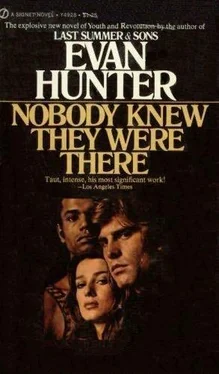Evan Hunter - Nobody Knew They Were There
Здесь есть возможность читать онлайн «Evan Hunter - Nobody Knew They Were There» весь текст электронной книги совершенно бесплатно (целиком полную версию без сокращений). В некоторых случаях можно слушать аудио, скачать через торрент в формате fb2 и присутствует краткое содержание. Город: New York, Год выпуска: 1971, ISBN: 1971, Издательство: Doubleday & Company, Жанр: Проза, на английском языке. Описание произведения, (предисловие) а так же отзывы посетителей доступны на портале библиотеки ЛибКат.
- Название:Nobody Knew They Were There
- Автор:
- Издательство:Doubleday & Company
- Жанр:
- Год:1971
- Город:New York
- ISBN:978-0094575004
- Рейтинг книги:4 / 5. Голосов: 1
-
Избранное:Добавить в избранное
- Отзывы:
-
Ваша оценка:
- 80
- 1
- 2
- 3
- 4
- 5
Nobody Knew They Were There: краткое содержание, описание и аннотация
Предлагаем к чтению аннотацию, описание, краткое содержание или предисловие (зависит от того, что написал сам автор книги «Nobody Knew They Were There»). Если вы не нашли необходимую информацию о книге — напишите в комментариях, мы постараемся отыскать её.
Nobody Knew They Were There — читать онлайн бесплатно полную книгу (весь текст) целиком
Ниже представлен текст книги, разбитый по страницам. Система сохранения места последней прочитанной страницы, позволяет с удобством читать онлайн бесплатно книгу «Nobody Knew They Were There», без необходимости каждый раз заново искать на чём Вы остановились. Поставьте закладку, и сможете в любой момент перейти на страницу, на которой закончили чтение.
Интервал:
Закладка:
Weglowski tells me, in impeccable English and with a dryness indicating he caught my earlier jibe, that he quite shares my concern.
There is no moon. The land slopes away before us, falling off toward the gap. A rabbit’s tracks hemstitch the snow, circle a tree, vanish. I am no longer fearful of rattlesnakes (it is my city belief that you do not find rattlesnakes in the snow), but now I am beginning to worry about wildcats or wolves or worse. I stay very close to Weglowski, who plows through the snow grunting and puffing, now and then muttering what I assume to be Polish swear words. Above us, on the highway, the headlights of an occasional automobile pierce the darkness, the clinking of tire chains merges with the brittle night The bridge is just ahead.
We hold a hurried consultation, our breaths billowing like comic strip balloons. Weglowski wants to know where I will do it, and at first I do not understand him.
“From where?” he whispers.
“What do you mean?”
“From where you blast?”
“Oh. I don’t know. Where do you think? I mean, where will it be safest for me?”
He looks around. The sloping ravine is barren of cover save for low outcroppings of rock and underbrush. There is, however, near the eastern end of the bridge, a huge boulder. Weglowski suggests that if I station myself on or behind that boulder, I will be safe from the blast and have a clear view of the bridge. I agree with him. We half slide, half run down the southern slope of the gap, and then begin climbing up to the boulder. It is not an easy climb. The northern side of the ravine is steep, and the snow has been blown off, leaving a treacherous escarpment of ice and rock. When we finally reach the boulder, my heart is pounding furiously, and I am covered with a cold sweat. But the boulder itself is a perfect observation platform, large enough for a man to lie prone on its flat top, commanding an unobstructed view of the bridge and its western approach.
As Weglowski starts across the tracks to the far end of the trestle, the knapsack full of dynamite on his back,
I am certain he will lose his footing and tumble into the ravine below, setting off a blast that will demolish both himself and the scheme. But he is a sure-footed old goat, and I watch him as he nimbly picks his way over the ties until he is consumed by darkness and I can no longer see him.
I stretch out on the boulder, and peer into the blackness.
The night is still. It is fiercely cold, but there is no wind. From the other end of the bridge, I hear sounds I think I can identify, the small mechanical click of a pair of pliers, the rasp of tape being tom. On the highway, in the distance, there is the jangle of tire chains, the hum of an approaching automobile. Headlights flash around the bend in the road, illuminate the highway guard rail, and pass on. The night is still again. I can hear my watch ticking in the darkness. The time is nine-thirty. Professor Epstein, wearing the costume we decided upon this morning, will have picked up Sara at her apartment a half hour ago. The masquerade party at Hester’s house will be in full swing by now. If all goes well…
Weglowski is coming back toward the center of the bridge, paying out wire behind him. He reaches the apogee of the arch, climbs under the tracks, and disappears from sight. I can hear the clicking of pliers again, the tearing of tape. He seems to be taking longer at the middle of the span that he did at the far end, and I assume it is because his hold is more tenuous there, suspended as he is above the deepest part of the gorge, and clinging to the girders for support. I look at the luminous dial of my watch. Thirty-five minutes have gone by since he left me here on the boulder, and twenty of those minutes have been spent at the keystone point. I wonder if he is having difficulty. There is the sound of another automobile in the distance, the metallic rattle of tire chains. I crane my neck for a view of the approaching car. As it rumbles past, I see the distinctive red dome light on its roof. The car does not stop, it does not even slacken its speed. But I keep watching until it disappears, and then I continue staring in to the darkness, listening, wondering if it will stop at the overlook where the blue Chevrolet is parked.
“Weglowski!” I whisper.
He does not answer.
“Weglowski!”
“What?” he whispers back.
“Hurry! That was the police!”
“What?”
“The police, the police!”
“What? What?”
I hear him scrambling from beneath the arch and onto the tracks above.
“They’re gone now,” I whisper, “but for God’s sake, hurry!”
There is silence for a moment Then Weglowski says, “Jackass,” and goes back to work.
In a little while, he comes into view again, paying his wire out behind him toward my end of the bridge. He climbs onto the boulder, takes the second knapsack of dynamite without saying a word to me, and then goes down to where the end of the arch is embedded in concrete below. He is at work for perhaps an additional fifteen minutes. When he climbs up to the boulder again, he is holding two strands of wire in his hands.
“These you connect to the box tomorrow morning,” he tells me.
In the basement of his house, I apologize for having alarmed him, explaining that I was frightened all along that he might tumble into the ravine and blow himself up. He is still miffed, and he tells me in his broken English that the whole point of Nobel’s invention was to combine nitroglycerin (“Volatile, extremely volatile,” Epstein has said) with various inert porous substances in order to reduce its sensitivity to shock and avoid accidental explosion. In other words, he could have fallen off that bridge with the knapsack full of dynamite on his back and suffered nothing more serious than a broken leg, do I understand?
I do not understand completely, but I would never admit it to him now. Besides, I am anxious to get on with this. It is twenty minutes to eleven, and I must get to Hester’s house before midnight I nod solemnly.
‘That’s why the box,” he says.
“The box,” I repeat.
“For spark,” he says, “for explode,” and then goes on to explain what he has done. The bridge is now wired with three fifty-pound charges of dynamite, one at each end and one in the middle. He has used five-pound sticks, tied together and then taped to the girders. At each end, he has placed his charge behind the footing even though he would have preferred setting the dynamite into a hole drilled in the concrete. He is certain he can blow out the footings this way, but he admits the other way would have been better. It is a matter of time and equipment, however; drilling into concrete is not a simple matter. He tells me again that he is sure the footings can be blown out this way, but I am beginning to think he doth protest, and he is making me slightly nervous. He speculates that the fifty-pound charge in the center of the span might be enough to knock down the bridge unassisted by the other two charges — but again he sounds dubious, and I cannot dismiss the feeling that he is not too certain about any of this.
He has wired the blasting caps in series, using a number-20 wire to connect the first charge to the second to the third, and then running his lead wires from the first charge and the third back to the boulder, where I am to connect them to the detonator tomorrow morning. He shows me the detonator now. He refers to it as “the box,” which is exactly what it is, a wooden box perhaps a foot high and six inches square. A metal plate is fastened to the box, giving the manufacturer’s name, and the serial number, and the model number, and an official title as well: blasting machine. I find that comical. It is a blasting machine; it looks exactly like all the blasting machines I have ever seen in movies from the time I was six years old, with a metal plunger sticking up out of its middle, and with two big brass screws and wing nuts around and under which I am to secure the lead wires tomorrow morning. Then all I have to do is push the plunger down (the last two inches are the only ones that count, Weglowski explains) and because the charges are wired in series, the electric current will hit the three blasting caps buried in dynamite sticks at precisely the same moment, and the footings and keystone will go together, the bridge will tumble into the ravine carrying the train with it.
Читать дальшеИнтервал:
Закладка:
Похожие книги на «Nobody Knew They Were There»
Представляем Вашему вниманию похожие книги на «Nobody Knew They Were There» списком для выбора. Мы отобрали схожую по названию и смыслу литературу в надежде предоставить читателям больше вариантов отыскать новые, интересные, ещё непрочитанные произведения.
Обсуждение, отзывы о книге «Nobody Knew They Were There» и просто собственные мнения читателей. Оставьте ваши комментарии, напишите, что Вы думаете о произведении, его смысле или главных героях. Укажите что конкретно понравилось, а что нет, и почему Вы так считаете.












